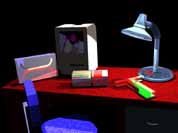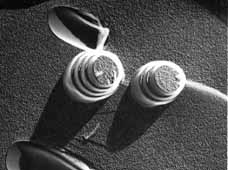
Bioengineering Department, Box 355061, University of Washington, Seattle, WA 98195, USA

 |
Bioengineering Department, Box 355061, University of Washington, Seattle, WA 98195, USA |
 |
"BIOSENSORS, Principles and Practice"
PAUL YAGER and Guest Lecturers
MW 3:00 - 4:20 p.m.
Lowe 219
This course is designed to give graduate
students (and qualified undergraduates) an in-depth acquaintance with
the growing and complex field of biosensors. The material covered
will familiarize the students with the sensors currently in use or
under development, how they operate, and under what circumstances
they can be useful. Emphasis will be given to critical comparison of
different sensor modalities and how their limitations in realistic
applications suggest the selection of one type of sensor over
another. New material for this year will focus on DNA probes and
microfluidic chemical analytical systems.
Meetings:
The course meets two times per week; the first of the meetings
will be a formal introductory lecture on a sensor-related topic. The
second meeting will be broken into three parts--the first will be a
completion of the preceding lecture. The second portion will be a
"Paper Review" presentation by Yager of one or two or papers that
represent typical work in the field, supplemented by material that is
necessary to understand them. The third segment will be an informal
discussion session in which the students will first explain and then
critique another research paper that they have been working on from
the week before.
Readings:
The main text is Principles of Chemical Sensors by Jiri
Janata (JJ), and a secondary text is Biosensors: Fundamentals and
Applications edited by Turner, Karube and Wilson (TKW). JJ is
available for purchase at the University bookstore. Copies of TKW
belonging to Bioengineering will be placed on reserve at the office
of yager's secretary for your use. On the day of the lecture given
each week one or more papers will be assigned. Master copies of the
papers will be deposited by that afternoon at the desk of my
secretary and can be picked up there for Xeroxing. Copies of the
articles to be discussed that week should be brought to
class.
Student Participation:
Students will be expected to perform three sets of tasks during
the course.
The first is active and informed participation in the Discussion sections; failure to participate will result in the loss of credit.
Second, the research paper or papers discussed
in the Discussion section will be the topic of a 3-5 page critique
due at the beginning of the following "lecture", usually the
following Monday. Discussion among students preparing these critiques
is strongly encouraged, but the actual writing of each critique must
be in the student's own words. Critiques more than one week overdue
will not be accepted. The critiques must address at least the
following questions:
Third, there will be a take-home final
examination. The exam will be handed out at the conclusion of the
final class just before the Course Evaluations. It is due on the
official date of the final exam at 5:00 PM in Yager's office.
Discussion of the final examination among students is not
permitted.
Grading:
In Class Participation: 7 x (2 points) = 14
points
Written Critiques: 9 x (4 points) = 36 points
Final Examination: 50 points
TOTAL= 100 points
For resolution of problems call
Paul Yager at 3-6126
Tentative Class Topics
Classification and Uses of Biosensors
The Chemistry of Enzymes
Protein Immobilization
Antibody Binding
DNA Probes
Thermal and Phase Transition Sensors
Acoustic/Mechanical Sensors
Potential-Based Sensors (pH and ISE)
Amperometric Sensors
Silicon Based Microsensors
Biocompatibility and Surface Fouling
Spectroscopies Used in Monitoring of Biomolecular Chemistry
Optical Waveguides
Microfluidic Chemical Analytical Systems
Sensor Integration and Systems Fabrication
Biomedical Sensing
|
Return to Yager's Syllabus Page Return to Yager's Home Page
|